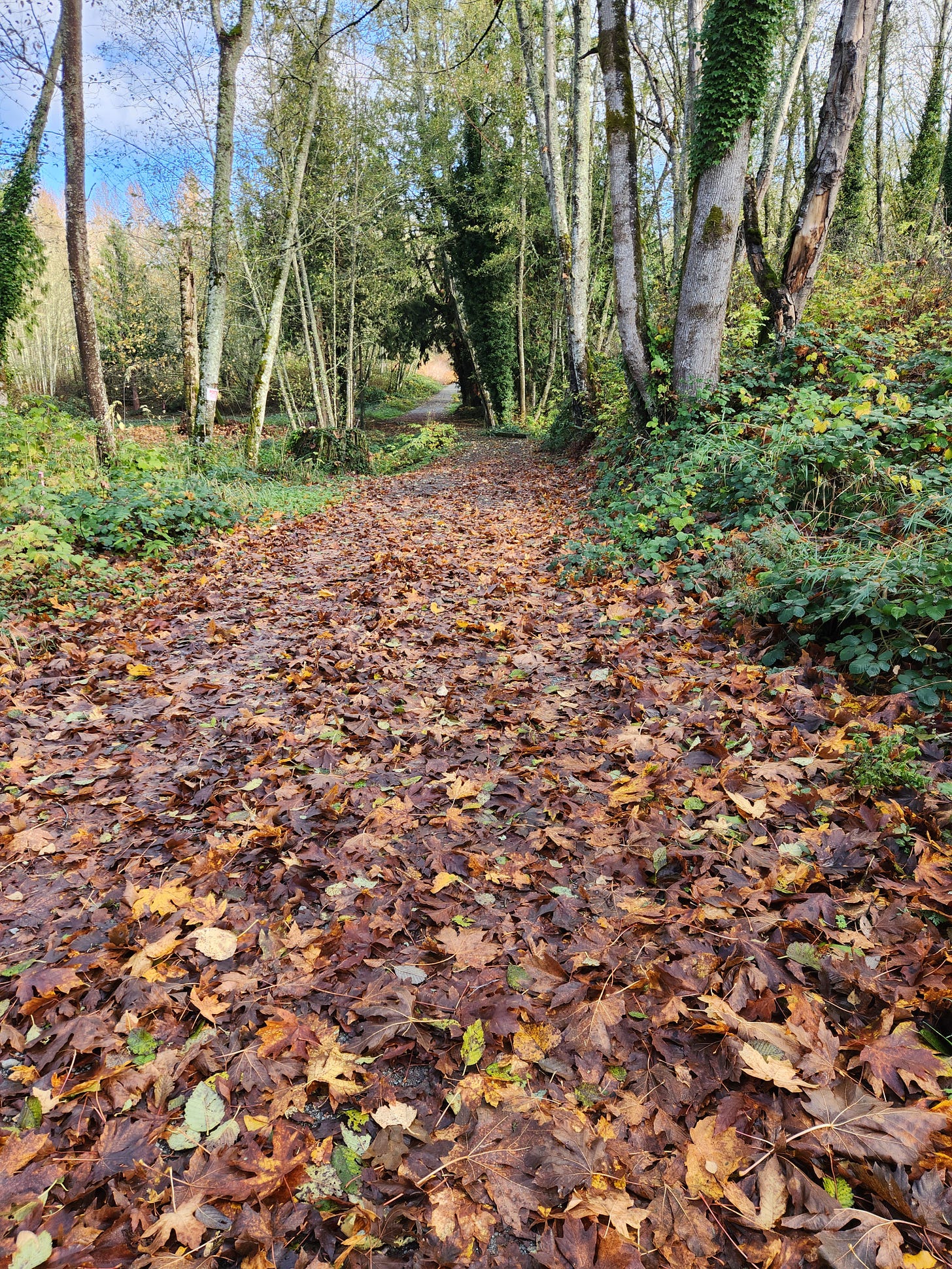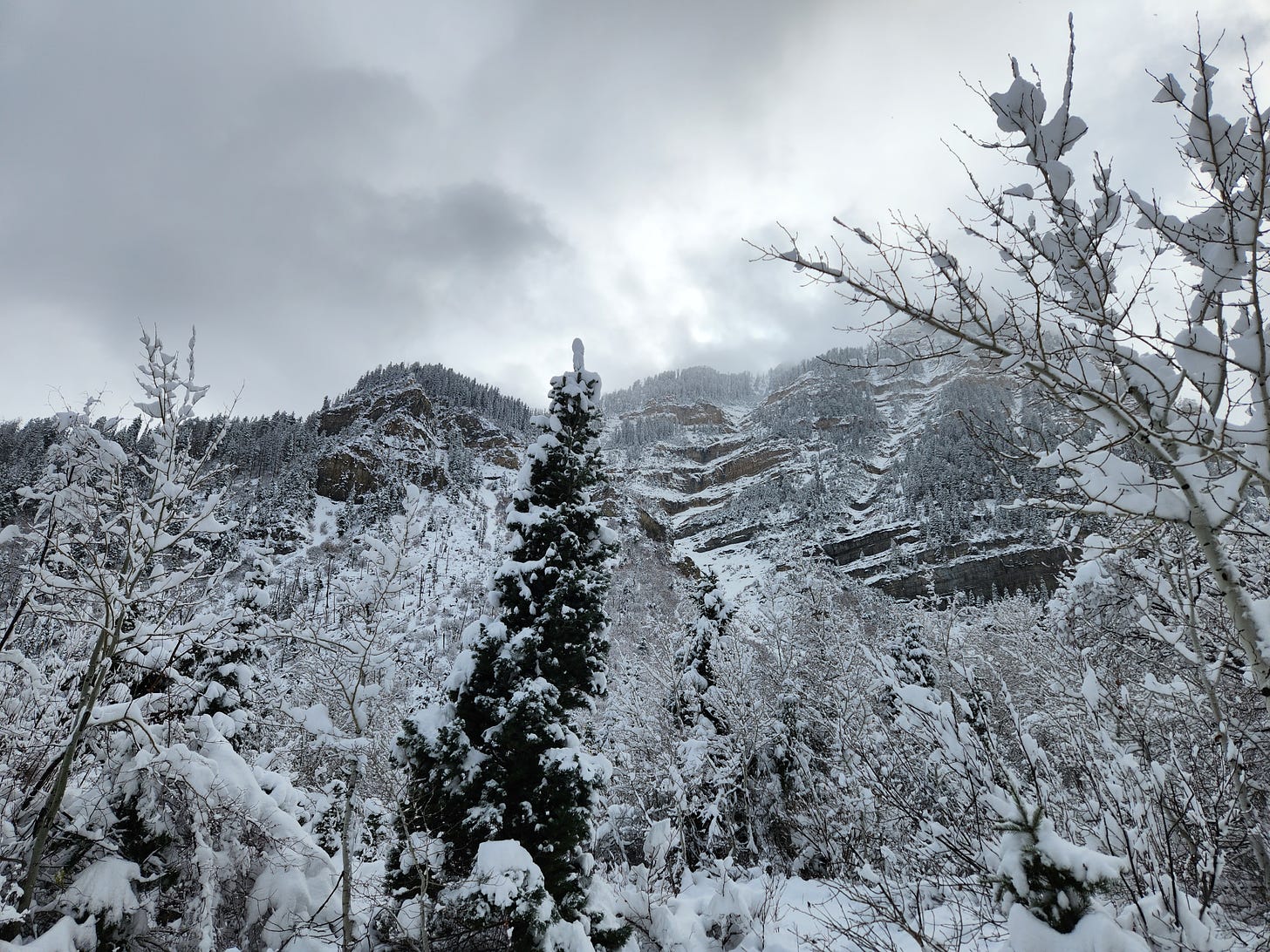Autumn arrived late here. Seasonal rain trickled in slower than usual. Leaves stayed on trees, undisturbed by typical fall winds. But the signs are unmistakable now: winter is coming. For The Wild Card this week, I’m musing about storms and connectedness. Read on!

Muir in a Storm
Last week, I revisited John Muir. Perhaps his most famous writing is the chapter in The Mountains of California (1894) where he recounts “A Wind-Storm in the Forests.” Muir tells of being in the Sierra Nevada in December 1874 when a winter storm came. For the adventurous Muir, the opportunity to explore a tempestuous nature was too great: “For on such occasions Nature has always something rare to show us, and the danger to life and limb is hardly greater than one would experience crouching deprecatingly beneath a roof.” He left his friend’s house and headed into the trees as the wind gathered strength. Once he trekked to the highest ridge in the vicinity, Muir decided that was too low and eyed a stand of young Douglas firs to climb even higher. Atop a tree, it swung 20 to 30 degrees, he estimated, as he clung there observing and experiencing nature’s power for hours, listening and smelling all that accompanied the storm.
The Inconvenience of Storms (and other unplanned emergencies)
Last week, I had to set my clocks twice. Daylight savings time ended; a windstorm momentarily flicked off our power. The season’s first big storm hit us over Friday night. The sounds of the wind woke me up. Even though the power stayed on through the night, an early morning “aftershock” caused a the quick gap in power service, so short it didn’t even merit an inconvenience.
Many of my friends, meanwhile, experienced something much more inconvenient. Where I lived for two decades, on the Palouse at the Washington-Idaho border, a natural gas line was hit by an implement and a line ruptured, affecting 37,000 people , many of them friends. During the subsequent outage, I have been watching on social media as friends chronicled the dropping temperatures in their living rooms, into the 50s, and then their jubilation when they saw the utility company’s trucks in their neighborhoods. Getting their furnaces and hot water heaters working again after several days has brought relief—and an end to the inconvenience of cold homes and showers.
Another Perspective
My mom tried to teach me, repeatedly, that, “Patience is a virtue.” Once I retorted, “No, patience is a waste of time.” This has been a family joke ever since, a shorthand way to remind me that patience is not among my highest virtues. If I were still on the Palouse this past weekend awaiting a return of hot water and heat, I’m certain the situation would have tested my patience.
Yet, despite my impatience, storms (and other inconveniences) often find another perspective arising for me. Storms remind me that I’m not in charge. When nature knocks out a powerline or ice makes roads impassable, I remember that all of us depend on vast systems that often insulate us from the natural world. When those systems break, I welcome—or try to, patiently—the reminder to think of more fundamental relationships. Rather than being insulated from elements, like we usually are, storms assert themselves, telling humans they cannot control everything. This comforts me, paradoxically.
Trying to Pause
To the southwest of my house, the Olympics Mountains are visible on clear days. After the weekend’s storm, they are standing out brightly. The wind and rain that pounded my home brought snow to those mountains. It is just the beginning.
Last week, the clocks slipped behind an hour, which means that at 5:00 when the workday for many come to an end, it is already dark.
Next week, Thanksgiving (in the United States) means many of my friends will pile into cars to drive over snowy mountain passes or brave the interminable lines in airports where they will then pack into planes. The travel time will feel compressed and for many of us our to-do lists will hang over our heads.
For those of us whose daily work does not depend on the weather, these shifts might be noticed, even lamented, but they matter very little practically. When we are connected more directly to seasonal rhythms, though, they would matter more.
For millennia, winter time was story time, a season of settling in and gathering together and slowing down. When our hours are billed at the same rate whether they fall in spring or winter, they pass more or less the same. But our species’ rhythms, I think, call for us to slow, to pause.
Storms remind me of this. Perhaps we would be better served, now and again, touching the rhythms beyond the clock.
Closing Words
Don’t miss the interview I posted this morning with Marina Richie. Paid subscribers can enjoy the entire thing; consider upgrading. Last week, I shared a new essay of mine, “War and Geese,” and I’m sharing the link again this week. (These sort of essays don’t come around often for me, so I want to share the news!)
As always, you can find my books, and books where some of my work is included, at my Bookshop affiliate page (where, if you order, I get a small benefit).
Taking Bearings Next Week
We march into The Classroom next week. I’m working on something related to organic agriculture, so I think the lesson will be related to that. Or Thanksgiving. Stay tuned!



